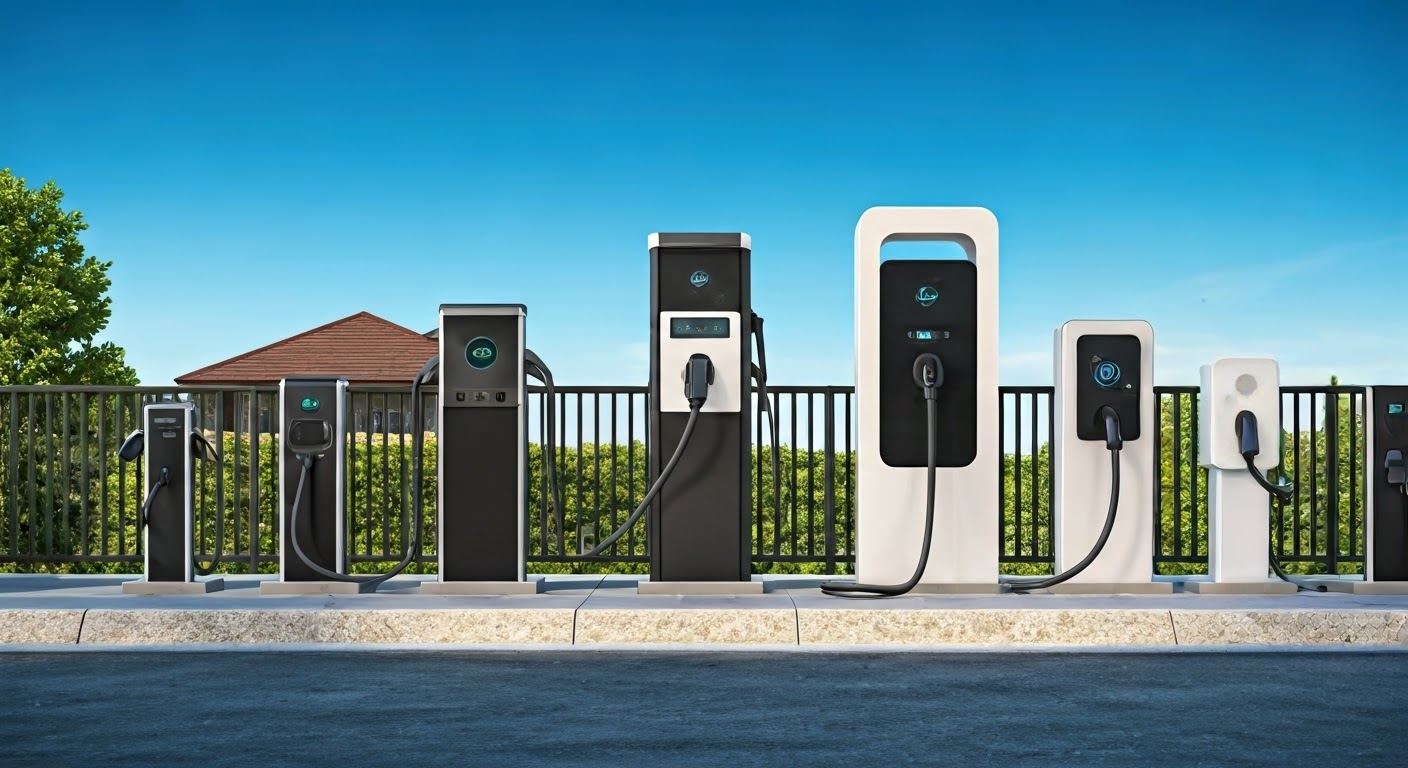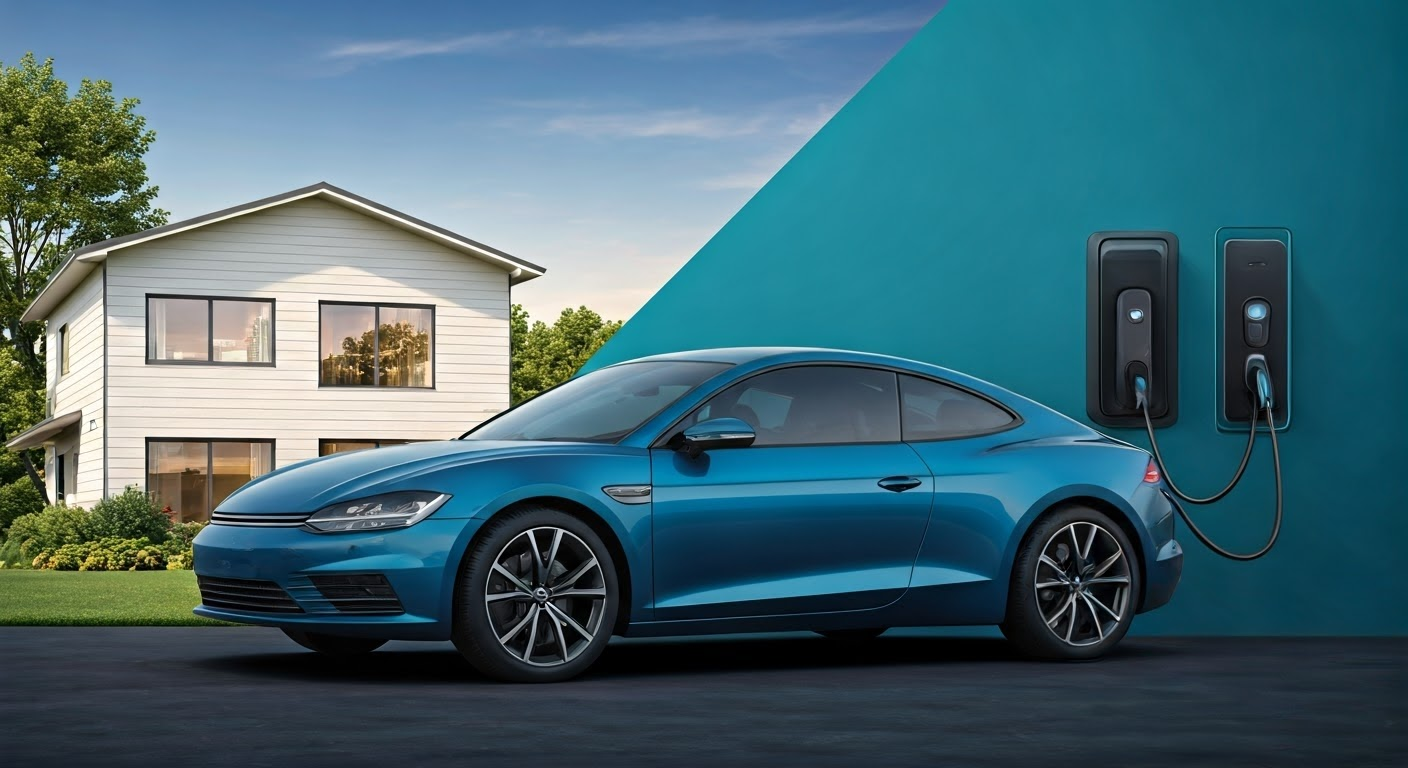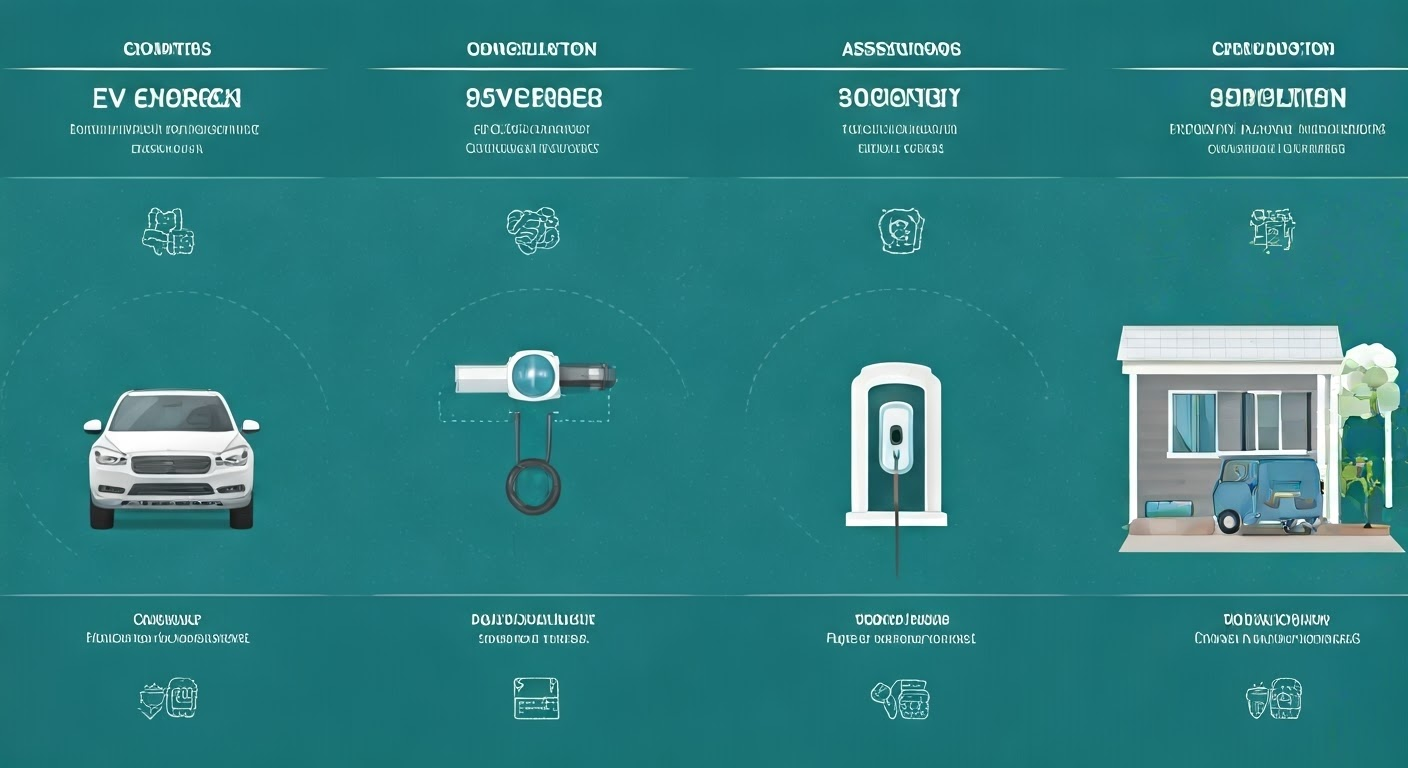
Key Highlights
- Discover the differences between electric vehicle charging installation for residential and commercial purposes, highlighting unique challenges and solutions.
- Learn about the electrical panel upgrades and dedicated circuit requirements for home and workplace charging systems.
- Explore personalized EV charging solutions tailored to your needs, whether at home or a business.
- Understand the comprehensive step-by-step process for safe and efficient EV charger installation.
- Gain insights into proven success stories of residential and commercial EV charger implementations in California.
- Find answers to common questions about charging speed, costs, and installation for renters and property owners.
Introduction
Switching to an electric vehicle (EV) means you need the right charging setup for your home or business, including an EVSE. You must check if your electrical panel can handle new charging demands and pick a charging station with the right speed. Installing EV charging does come with some unique things to think about.
At home, your charging setup should fit into your daily routine. At work, the focus may be on making charging easy at the workplace and using smart EVSE chargers. When you know about the different problems and the best ways to solve them for charging systems, things go smoother for you. Let’s go over the differences in charging needs and what you should know about EV charging and stations.
Understanding the Challenges of EV Charger Installation

Installing an EV charging station needs more work than just plugging in a cord. You have to plan and talk with experts first. It helps to be ready before you start. It does not matter if you are putting in a home charger or are looking at workplace charging, you might run into things like electrical panel upgrades, permitting, or checking if the charging system matches your power needs during the electric vehicle charging installation process.
There are different things you need to think about with home and business locations. Your home’s electrical capacity may not be enough, and so you might need improvements. On the other hand, a business will often need a special circuit and more than one charger. If you understand these details, you make it easier to switch to EV charging through proper electric vehicle charging installation.
Residential Barriers to Effective Charger Setup
Residential Electric Vehicle charging installation usually starts with checking your electrical panel. Most homes do not have enough power for the installation of a Level 2 EV charger. This type of charger uses 240 volts. You will likely need a licensed electrician to look at your system. The electrician can tell you if your home needs electrical upgrades.
Many people also think about where to put the home Recharging station and the charger location. If your garage or parking area is far from the main electrical panel, installation costs can be higher. This happens if you need more wiring or if the permitting gets more complex. Picking the right spot for your charging station helps lower these costs.
Homeowners should also know about incentive programs. Some states, like California, give rebates when you install EV chargers at home. These programs can help with the cost and make using greener energy easier. When you talk to a licensed electrician, they can help you solve these problems. This way, your ev charger installation will be safe, effective, and work well for you.
Commercial Installation Hurdles
Commercial EV charger setups have some special challenges compared to home Electric Vehicle Charging Installation. The biggest is that workplace charging needs more electrical capacity. There may need to be a dedicated circuit so all EVs can charge at the same time without any problems.
The process of putting in chargers can also be tricky. Some workplaces want to put many smart chargers in their lots or parking garages. This means there needs to be a look at the site first, so the chargers go in the best spot to cut down on any energy loss.
There is more to think about if you look at the cost of Electric Vehicle charging installation. Businesses sometimes have to buy additional equipment like sub-meters. This can make installation costs go up. They also must follow all local rules, like what California asks for, so they do not run into trouble in the future. All this helps keep workplace charging for employees and customers working well.
Tailored Charging Solutions for Homes and Businesses

Having the right EV charging setup for your needs is important. This is true whether you need charging at home or for a business. A solution that fits well will keep things running smoothly now and for years to come. You will need help from someone who knows electrical upgrades, local rules, and what works best for your area. This help makes the job much easier.
For homes, people often have to pick between portable chargers or chargers fixed to the wall. For businesses, the answer is different. Offices and stores need solutions that can grow as more EV drivers turn to electric vehicles. Let’s look at how custom charging setups can help you use less energy and work better. This is true for homes and businesses alike. With a thoughtful approach, EV charging and the right electrical upgrades can make all the difference.
Rebates Custom Home EV Charger Installations
Homeowners who want to install an electric car charging station need to look at how easy it is to use and if it will work for their car. A home charging station, like a Level 2 charger, can give you 13 to 25 miles of range each hour of charge. So, you can charge your car much faster.
It’s important to hire a certified electrical contractor. The contractor will check your home’s electrical panel. They need to see if your panel can handle the new charger or if it needs upgrades, like installing special circuits. Some older homes may need new wiring or panel upgrades to be safe.
There are also many incentive programs available for homeowners. These can help lower installation costs. For example, people in California can use rebate policies to save money when getting a home Recharging station.
If you use a smart charger with Wi-Fi, you can manage your charging from an app. This helps save energy and makes things easy for you. Setting up your charging system in a way that matches your driving and plans for new tech is a good idea. This way, your Recharging station can continue to be useful for you now and later.
Business-Specific EV Charging Solutions
Businesses that want to make their EV recharging better can work with an EV manufacturer and use smart chargers that grow as they need. For example, if you use DC fast chargers, you can charge cars quickly. This is good for people who do not have much time, like busy customers or workers.
Smart Wi-Fi chargers enable you to monitor and manage your energy usage, helping reduce costs. Some systems are designed for simultaneous workplace charging of multiple vehicles.
If you use incentive programs and tax credits, it can bring down the cost of getting started. In California, some companies get grants for using more renewable energy. Using these solutions does more than help you follow the rules. It also shows that your business cares about green energy, which many people like. This makes your business look better to customers who care about the environment and EV charging.
Step-by-Step Process for Installing EV Chargers

Installing an electric vehicle charger at your residence or business involves several steps. Each phase, from evaluating the site to selecting the most suitable charger, brings you closer to a seamless and hassle-free installation. Professional technicians ensure that the work is completed correctly, swiftly, and in compliance with regulations.
Doing each step this way helps your charging system work well. It can help lower your costs and keep your permitting needs in check. Let us walk through each step of this process for your ev charger.
Initial Consultation and Site Assessment
Every installation of an EV charger starts with an initial talk and check of the site. At this time, a licensed electrician looks at your property to see what can be done. The electrician will let you know if you need any electrical upgrades, like more wiring or changes to your service panel.
For businesses, the check will also cover if the main panel has to support many smart chargers. Finding out these things at the start can help people avoid delays and help make the process go well.
During the talk, you also go over the different permitting needs related to ENERGY STAR products. Licensed professionals will explain all the steps to get permits so your EV charger meets rules, including ensuring ENERGY STAR certification. This step is key to make sure you get the charger you want and follow all energy rules in your area.
Choosing the Right Type of Charger
Choosing the right charger makes sure you get the energy and time you need for your EV. Think about how you drive your EV, how many miles you go each day, and where you usually park.
- Level 2 chargers: These work well at home. You can get up to 25 miles of range for each hour of full charge. Level 2 chargers are easy to use, good for saving money, and don’t need much work each day.
- DC fast chargers: These chargers fit best at commercial spots or for times when you need to charge fast. DC fast Recharging can give your EV up to 80% charge in only 30 minutes.
- Portability: There are some Level 2 chargers with portability, so you can take them with you. This helps people who rent and can’t have a forever setup.
A licensed electrician helps you choose the best options for your budget and needs. Making a smart choice now prepares you for future Electric Vehicle Charging Installation. Select the right electric vehicle charging installation that fits your requirements.
Installation and Testing
The final step in electric vehicle charging installation is setup and checks. Certified installers will inspect the wiring, circuits, and all components to ensure compliance with safety standards.
The installation costs can go up if the job is harder. Electrical upgrades, such as rewiring or adding longer cables, may add more costs. That is why you should always get a clear quote. After working, professionals also check the charger to see if it will work with your ev and the power in your area.
After putting everything in place, testing helps make sure the system works well. Certified tests can show if the charger performs like it should, so you feel safe using it. This makes you know the risks are low, and you are ready to start recharging your ev right away.
Why Choose Our Electrician Services for Your Plug In EV Charging Needs
We take pride in giving safe and reliable EV charger installations for both homeowners and businesses. Our team has skilled and certified technicians. They have a lot of experience, so you can be sure your project gets done with care and the right skills.
We put a high focus on following all laws and rules. The team makes sure that every EV charger installation meets California’s strict rules and uses good energy-saving methods. We always meet quality and legal standards. When you choose us for your EV charger, you will have a smooth and worry-free process. Your safety and satisfaction are important to us.
Certified and Experienced Technicians
Our team is made up of certified technicians who have many years of experience in EV charger installation. We have worked on a lot of home and worksite charger jobs, so you can trust us to do good work every time.
Customer service is at the heart of what we do. From the first talk to the final test, our installers are open and honest with you. They make sure you know what is happening at each stage. We check every wire, circuit, and connector with care to make sure all parts are put in safely and in the right way.
We also keep up with the latest news and changes in how people use chargers. We know all about smart chargers and incentive programs, so we can help you find what fits your needs best. When you choose us for your ev charger installation, your project is in trusted hands.
Permitting Compliance with California Regulations
We make sure our EV charging setups match California’s strict rules for Electric Vehicle Charging Installation infrastructure. Our team knows about local permitting and what energy-saving steps the state asks for.
From home charging to business locations, we start with a plan made just for you. Our licensed electricians handle all electrical upgrades. They always follow the rules for charging systems. We add approved features like sub-metering, as the state of California wants.
We also help you get the most from California’s strong incentive programs for Electric Vehicle Charging Installation. This can lower your installation costs. With us, your charging system will meet every protocol and be up to all standards.
Proven Successful Pricing in EV Charger Installations
We have a strong history of doing successful EV charger installations. This shows our commitment to good quality. From installing chargers at homes in California to handling large charging projects for businesses, we use our experience in every job.
The people who use our services say that we pay close attention to every detail. We make sure each EV charger setup is done with care and is up to code. Let’s take a look at how we have helped both homes and businesses get better EV Recharging with our professional service.
Case Studies of Residential Installations in California
Residential EV charging needs custom solutions, including options for plug-in hybrid (PHEV) vehicles. Our case studies show how we handle this. For example, a homeowner in Los Angeles wanted a Level 2 home charging station for their Nissan Leaf. It had to be able to charge the car overnight. After we did a site check, we found that the electrical panel needed a small upgrade. We took care of this work fast.
We had another client in Malibu. They needed a portable charger because they lived in a rental property. We suggested a wall-mounted portable recharging station. This makes things easier for them in the future. We did our job with little disruption and followed all of California’s rules for tenant EV charging.
These wins show our skills in handling problems while giving people good home recharging station options for their EV.
Commercial Installer Installation Success Stories
In one recent project, a Benicia office wanted to add install a electric vehicle charging installation. We ended up putting in a group of smart chargers that can grow with the company. These were connected to their energy management software. This let them see charging details and track costs with ease.
A retail business in Walnut Creek needed dc fast chargers. The goal was to make sure customers do not have to wait too long. Our group did the job smoothly and finished it before the deadline. We also followed all local rules.
These stories show how our business gives solutions that fit different needs in a good and professional way with smart chargers, charging set-ups, and dc fast options. If your in one of these city’s we can help with a electric vehicle charging installation in: Benicia, Concord, Walnut Creek, American Canyon, Fairfield, Vallejo, Martinez, Pinole, Hercules, Pittsburg, Pleasant Hill, Suisun City, Antioch, Rodeo, Bay Point, Alamo, Lafayette, Orinda, Danville. All our electric vehicle charging installation are simple and very easy on the owners. Call Us any time with questions about a electric vehicle charging installation for your home or office!
Conclusion
To sum up, it is important to know the different steps and needs for Electric Vehicle Charging Installation at home and in your business, including how to properly install an electric vehicle charging installation. This gives you the right information to help you choose what works best for you. If you want an EV charger at your house or you need a bigger setup for your business, a custom plan will make sure the electric vehicle charger fits what you need.
It is always safer to pick certified and trained people for the job. This means your electric vehicle charging installation will be put in the right way and will follow the rules. Our team has done many EV charger jobs for homes and businesses, and we want to help you with trusted charging solutions, so you feel good about moving toward a cleaner future. If you want help or need answers about electric vehicle charging, do reach out and talk to us today.
Frequently Asked Questions
How long does an electric vehicle charging installation take?
A standard electric vehicle charging installation usually takes one to two days. The timeline can change depending on site conditions, electrical panel upgrades, or permitting requirements.
What’s the difference between residential and commercial electric vehicle charging installation?
Residential electric vehicle charging installation often involves upgrading an electrical panel and adding a Level 2 charger. Commercial installations require higher capacity, multiple chargers, and dedicated circuits to support employee and customer EV charging.
Do I need an electrical panel upgrade for electric vehicle charging installation?
In many cases, yes. Most homes and businesses require a panel upgrade during electric vehicle charging installation to safely handle the increased power demand of Level 2 or DC fast chargers.
How much does electric vehicle charging installation cost?
The cost of electric vehicle charging installation varies. Home installations may range from $400 to $1,500 before upgrades. Commercial installations cost more because they often involve multiple chargers, sub-meters, and compliance with local California regulations.
Can renters request electric vehicle charging installation?
Yes, renters can ask their landlords for permission to proceed with electric vehicle charging installation. Portable chargers or wall-mounted options are often best for rented properties, and California law allows tenants to request EV charger setups at their own expense.
What type of charger should I choose for electric vehicle charging installation?
For home setups, Level 2 chargers are most common. For business locations, DC fast chargers or smart workplace charging systems are better. Your electrician can help select the best option during the electric vehicle charging installation process.
Are there rebates or incentives for electric vehicle charging installation in California?
Yes, California offers rebates and incentives to reduce the cost of electric vehicle charging installation for both residential and commercial projects. These programs make adopting EV charging more affordable.
Is professional help required for electric vehicle charging installation?
Absolutely. A certified electrician ensures your electric vehicle charging installation is safe, meets California codes, and avoids costly mistakes with wiring or permitting.


